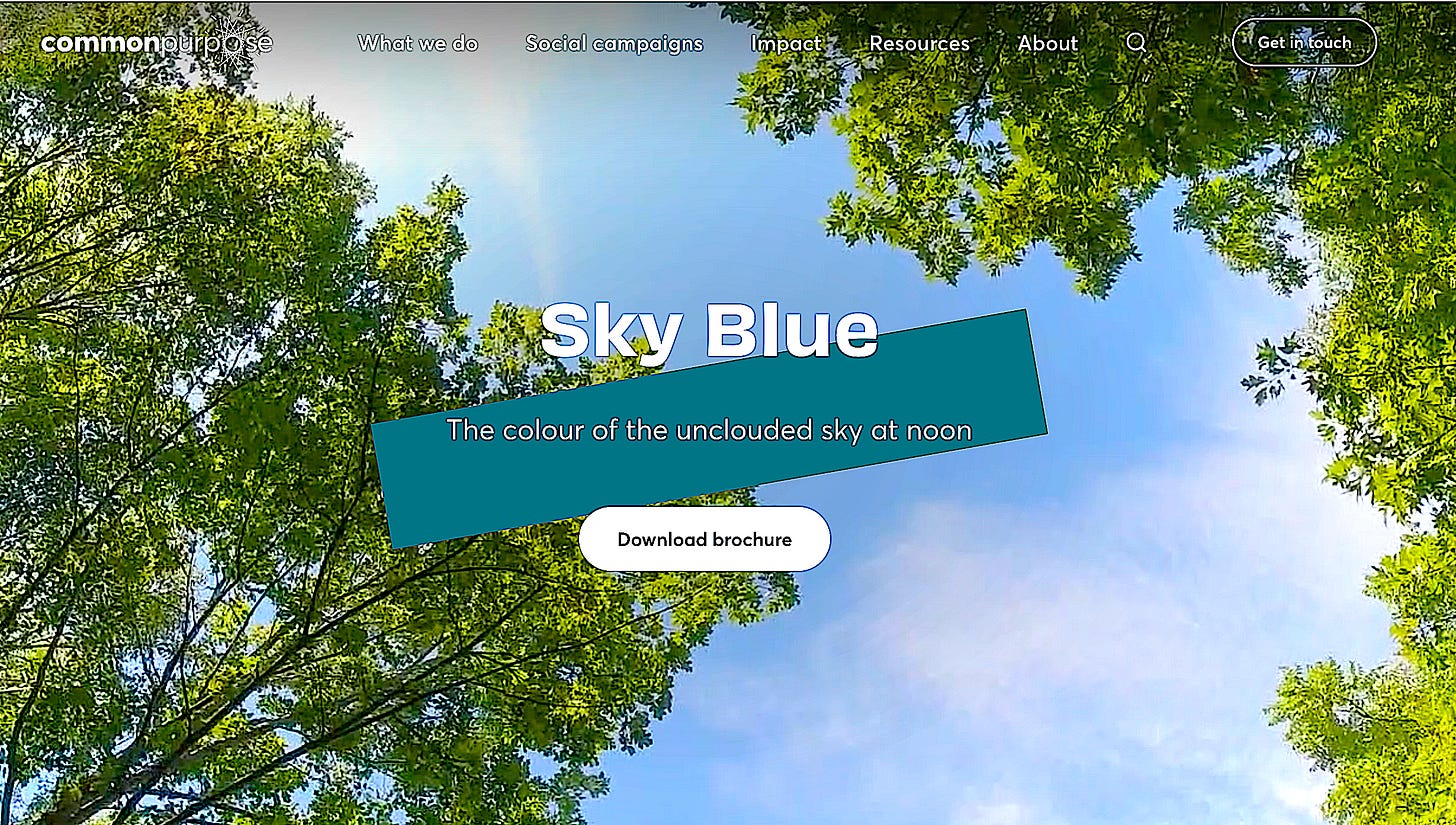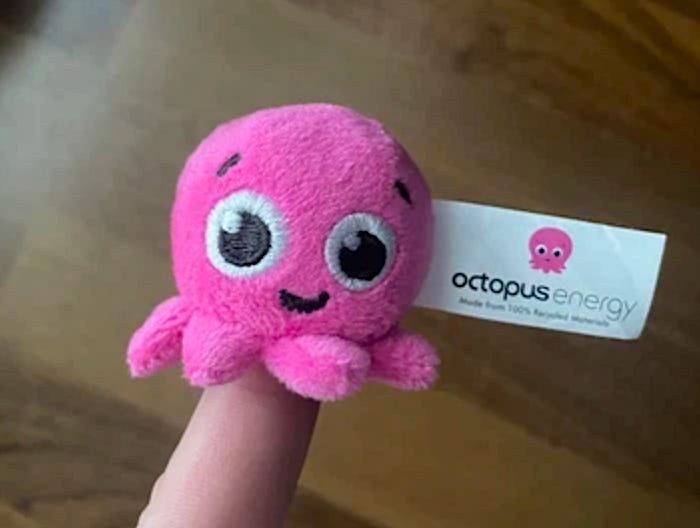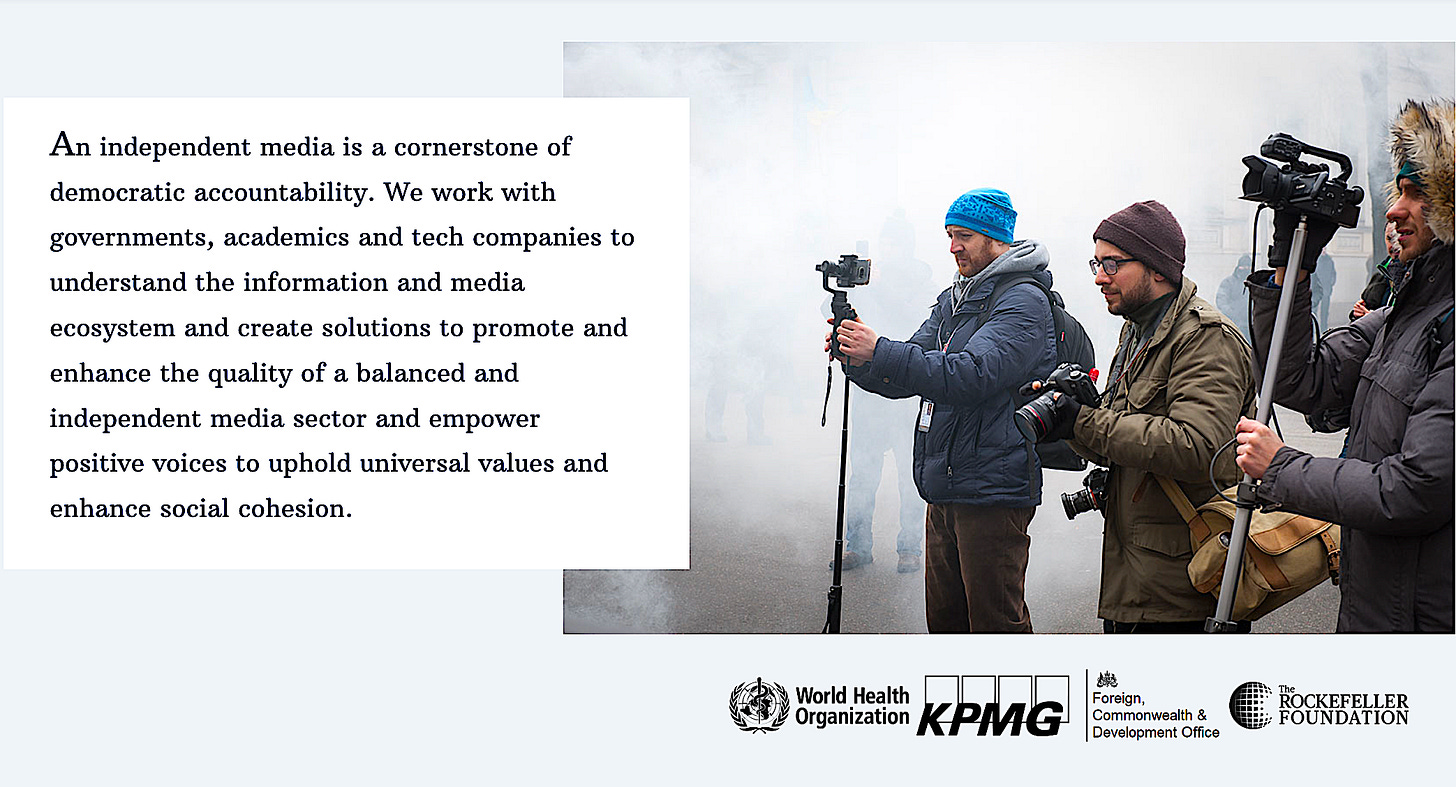In The Hidden Mechanisms of Unfreedom series, I've examined various ways in which democracy is being covertly undermined, with power and resources being steadily transferred from ordinary people to a small elite.
The first essay looked at how well-intentioned organisations such as think-tanks have been co-opted into the service of a technocratic takeover, their independence used to give unpalatable policies a veneer of respectability. The second essay examined the art of manufacturing consent whereby polls and citizens' assemblies are used to create the perception of agreement to things the public doesn't really want.
The third essay covered the rise of a new kind of censorship in which government, Big Tech and supra-national organisations seek to control the sphere of information to the point where alternatives to the official view don't even surface. And the fourth piece concerned the conduits and networks by which decisions that should be made openly and democratically are being taken behind the scenes and presented to the public as done deals.
As I've said before, the mechanisms of unfreedom tend to overlap. The current push for compulsory digital ID is a case in point. Since the idea has been repeatedly rejected by the British public, no political party cares to champion it; not long ago the Labour government assured the nation it was out of the question. Instead, digital ID has been repeatedly pushed into the public sphere by Tony Blair and his think tank with a series of media articles or appearances presenting it as “convenient”, “money saving” and “inevitable” - and the “solution” to illegal immigration.
Then, with the idea of digital ID is firmly established in the public mind and the immigration crisis looming large, another think tank publishes a report outlining the case for Britcard. (I wrote about this for The Spectator). A government minister endorses the idea on radio and a couple of months later, the Prime Minister announces that the government IS exploring options for a centralised database holding our personal information and acting as the gateway to public and financial services. And so we have Mechanism #1, in which think tanks smooth the way for an unpalatable policy, creating the impression that politicians are sensibly adopting an idea that is already out there.
Digital ID is, as many in Britain realise, a trojan horse - a mechanism I'll be covering in this Substack. This strategy facilitates the introduction of a policy that would never gain public acceptance if described truthfully, presenting it in the most innocent of lights. Once in place, the new system or measure is used for other, less benign purposes - but by then people tend to feel “it's too late” to resist. Recent examples include the NHS App and Ukraine's digital ID app Diia – both initially presented as providing easy access to services and subsequently used as vehicles for vaccine passports.
Now that Britain has arrived at the crossroads with digital ID other mechanisms are being deployed, such as the use of polls to create a disempowering sense that “everybody” wants it. Polls have been published in the media “demonstrating” public support. One poll of 1116 adults by Ipsos is the basis of a claim that 57% of Britons favour compulsory national ID; another generates the headline that “consensus is building” for digital ID. Really? Look closer and you'll find that 582 Labour Party supporters are following their leaders.
How effectively polls worked for Covid restrictions! Mechanism #2 of Manufacturing Consent is vital for digital ID since, like vaccine passports or digital currency, it requires mass compliance or, in the policy jargon, “adoption” by the public. That makes it very different from the WHO's Pandemic Treaty which has now been adopted by the UK government, or the introduction of biometrics for entry to EU countries - which have both happened without consulting the public.
The mechanisms of unfreedom vary; some involve the creation of infrastructure and systems behind the scenes, while others work in the realm of information and perception. What they have in common is that when you look far enough – and usually you don't have to look far – you'll find they're backed by large organisations and big budgets. The stratagems have been in the making for years, often decades. Forming alliances and networks, building organisations and developing systems takes time.
Slowly, slowly catchy monkey
A further characteristic of the mechanisms of unfreedom is how they draw on human traits and emotions: our desire to help, to do “the right thing”, to believe the best of others. They also rely on our tendency to take things at face value. Innocence is a quality with a good and a shadow side; it needs to be tempered with realism and experience. When innocence is laced with complacency and shored up with denial, we become like Red Riding Hood taken in by the smooth talk of the wolf.
The success of the mechanisms of unfreedom depend on our continuing innocence.
So this, the fifth and final piece in the series, focuses on manipulation and deception in the form of fronts – organisations and policies which purport to do one thing but do another – and the use of images and words.
We can start to see through the sheep's clothing of this latest pack of wolves. Humans have wised up throughout their history, coming to understand how organised religion keeps its power and to recognise the tricks of modern advertising. We readily see manipulation in personal relationships and how certain employment arrangements are set up to take advantage. Now we need to take the next step and recognise deception in the social and political spheres.
Images and words
In all this discussion of the tactics deployed by the powerful, I've failed to take account of one of the most important: the use of image.
Images, as those practising the art of persuasion have long known, are great ways of manipulating perception. I think of one of the few Catholic murals not destroyed in the Reformation which graphically portrays what happens if you don't tow the line. I think of the TV adverts of my youth with their depictions of the glamorous life you could have if you smoked or bought a fast car. Images are highly efficient carriers of messages. They've got into your psyche before you've had time to make a conscious decision whether you want them there and, once imprinted, are hard to shake off.
The images on the website of the Tony Blair Institute for Global Change feature people who are smiling or enthused, mostly black or Asian, in shiny offices, at conference tables or in hot countries. The message they convey is something like: We. Working. Global.
The section entitled “Future of Britain” goes a layer deeper. It contains detailed policy papers outlining Blair's vision for the UK including the technocratic healthcare system I covered in the last Substack. The message of the accompanying images is Tech or, more specifically: Tech=health. Most show people holding a smartphone or tablet, displaying a wearable or having a vaccine.
The main picture is the most telling of them all. It shows a small boy standing in front of solar panels which, according to the doctrine of Net Zero, must cover the British landscape. We can't see the boy's expression, but he's meant to be contemplating the enormity of our technological achievement with awe.
I like to think the boy's face might be registering bemusement, but the photo could equally be depicting his powerlessness. The picture contains nothing except panels, boy and a strip of grass: there's nowhere to play, no trees or sky, no horizon suggesting new possibilities. It's just Man (in the making) and Machine. That's the technocratic future Blair envisages for the children of Britain.
Solar panels are very much on my mind. In August, I returned to the landscape of my youth and accidentally found myself witnessing the construction of the UK's largest solar power plant in a rural residential area. Blocks of concrete filled fields formerly filled with crops - I wrote about it here.
The images on the Blair Institute are typical of those on the websites of philanthropy organisations and their commercial partners. The endless photos of people and tech carry a subliminal message: the transition to technocracy is underway. Those running the organisations are in charge, and the websites are merely informing us what to expect. They’re supplemented by language, the kinds of memorable words and phrases commonly used in marketing and propaganda whose power derives partly from repetition to a mass audience.
But the technocrats of our times use language in more slippery ways. “Disruption”, “transformation” and “reimagining the state” dominate the text on the Blair website, signalling the changes that are planned. Since we're talking about governance, they're half-telling us about the end of democracy. Words are also used to deflect criticism and distract from the real issues - the phrase “human-centred” peppers the talk of AI and technology as “the driving force”. Meanwhile, the World Economic Forum stresses the importance of “trust”. This is quite a complex linguistic manoeuvre, acknowledging the decline of public trust in institutions and authorities but directing the blame away from the real cause - the coercive, impoverishing plans overtly espoused by the likes of the WEF - to other parties and causes.
When euphemisms combine deception with measures that blight everyday lives, using language to manipulate soon backfires. In an internal report, Bristol Council, now in its third year of trying to impose Low Traffic Neighbourhoods across the city, has discovered that using “confusing and vague language … such as a 'modal filter' to describe a bollard” has alienated people and recommends the council be more “transparent” in its communications. Ironically, it fails to recognise the key linguistic deception: pretending that road closures, longer journey times and fines will somehow make life more “liveable” - and meanwhile the council is ploughing on with a giant LTN in the south of the city.
A further use of language baffled me until I worked out that it entailed inversion, using terms such as “democracy” to mean the opposite. This semantic trick is used by organisations of all kinds and sizes, from the British think tank Demos to big globalist foundations to justify changes that are profoundly anti-democratic: censorship or the abolition of public consultation is needed to “save” democracy.
Here's an interesting deception from the Common Purpose website involving both word and image. What do you see?
Trojan horses
When about twenty-five years ago, I started to hear that Bill Gates was putting some of the enormous fortune he'd amassed through Microsoft into philanthropic projects, I didn't think much of it. Just a half-formed “good” and “but why did he need to charge so much in the first place?” floated through my mind.
Little did my former innocent self realise the extent to which certain policies and ideas, far from arising organically out of society and benefiting from the contributions of benevolent pioneers, were being seeded by the wealthy and powerful with the aim of achieving particular goals.
I can’t put it any better than Badria Timimi in the documentary The Agenda explaining the role of financiers in “saving the planet”: “With the green economy worth trillions to investors and corporations alike, it’s hard not to see a conflict of interests. Are the bankers raising money to achieve the United Nations’ Sustainable Goals? Or are the goals the trojan horse to change the world’s financial control systems?”
Clean Air, Dirty Money, Filthy Politics by Ben Pile documents the web of organisations and funding underpinning policies which purport to be green but remove money and power from people. The mayors behind the clean air schemes of London and Bristol are deeply embedded in this network: Sadiq Khan is co-chair and Rees a member of C40 Cities, a global network of mayors committed to climate change policies. The funders of C40 Cities include Bloomberg Philanthropies, the Children's Investment Foundation and the Clean Air Fund. And who funds the Clean Air Fund? Why, Bloomberg Philanthropies and the Children's Investment Foundation!
Think tanks have similar backers. The once-independent Institute for Public Policy Research now receives grants from organisations financed by wealthy philanthropists such as Gates, Soros and the Rockefellers, along with a number of pharmaceutical companies and - more on this later - Octopus Energy. The IPPR gets a significant grant from the European Climate Foundation, itself financed by the Rockefellers, Bloomberg Philanthropies and the Children's Investment Foundation.
Circular funding streams, organisations nested within each other like Russian dolls, point to one thing: a powerful network of vested interests using fronts to further their goals. When there's enough of them, or when particular organisations exert the level of influence the Blair Institute has over Britain, they form a parallel political eco-system which can circumvent the processes and safeguards of democracy.
The unwitting taxpayer often makes a contribution. C40 Cities is part-funded by the Foreign Office and Demos has received grants from the Cabinet Office and GCHQ. The cycling charity Sustrans has been repeatedly and generously funded by the Welsh government – ironically for work which includes lobbying the government to do things that will win it government contracts. And why did the IPPR get a donation from cash-strapped Bristol Council?
Consumer fronts
We have a trust in household brands that's hard to shake. Names such as “Tesco” and “Sainsbury's” have entered the language as synonyms for everyday life; supermarkets' products and stores have a comforting familiarity. It's hard to believe they want to do anything more than sell us groceries. I struggled with this until the automation of my local Sainsbury's, combined with the company's overtly dystopian Future of Food Report meant I had to put down my shopping basket and leave for the last time.
Sainsbury's continues to tread the path to technocracy: the chain has just announced it will be trialling live facial recognition in a store near me.
The energy sector has some prime examples of organisations which have been conscripted to a wider agenda.
Octopus Energy entered the UK market in 2016 on a tide of consumer discontent, promising to treat people better than the other companies. Since then, its ubiquitous advertising has promoted its friendly, responsive customer service. Octopus has been a Which? Recommended provider for several years and is now the UK's biggest electricity supplier, with over seven million customers, and operates in 32 countries.
My experience of Octopus though two inherited accounts made its popularity look puzzling. The company bombarded me with correspondence and at one point daily telephone calls which I believe to be due to a company policy to harass those not paying by direct debit. Bills were complicated and opaque. When I finally switched provider, leaving a negative review on Trustpilot, Octopus tried to get it taken down. A close look at its online reviews revealed that other customers shared my experiences, along with what looked like corporate attempts to manage public perception by abandoning listings with unfavourable reviews.
When there's a big gap between your experience and what you're being told, it's a good idea to ask questions. In a sector where new, small companies tend to fail, how did Octopus reach this position in such a short time?
The first part of the answer is: powerful financial backers.
Octopus has received hundreds of millions of dollars from Generation Investment Management which was co-founded by Al Gore. In 2022, the UK government lent the company £4.5 billion to finance its takeover from the bankrupt Bulb, quickly building its share of the market. Two years later, British taxpayers provided Octopus with over £10 million in financial assistance.
Why are wealthy philanthropists and government so keen to support Octopus?
The company is a vehicle by which they can achieve certain objectives, the nature of which can be seen in the things Octopus does above and beyond its stated purpose of providing households with energy. The Octopus Centre for Net Zero, launched in 2021, conducts research into heat pumps, electric vehicles, smart meters and “demand flexibility” – a euphemism for rationing. In 2022, the company ran a trial with the National Grid in which 1.4 million customers with smart meters were offered free energy to reduce their usage at certain times. Subsequent “Saving Sessions” were rewarded first with money but then just the chance to win prizes.
Essentially, Octopus is testing the public appetite for energy rationing - something quietly supported by government. NESO, the body responsible for overseeing the switch to renewables, has said that energy for households and businesses will have to be rationed if Britain is stop using fossil fuels by 2030.
Persuading the members of a developed society that they might regularly have to do without hot meals and showers, postpone Zoom calls and school runs, shut their businesses and sit in the dark until the power comes back on isn't easy. When you're trying to accomplish something difficult, connections help. In August, Octopus founder and CEO Greg Jackson was appointed as a government adviser, with a three year term on the board of the Cabinet Office.
Emotions as conduits
Emotions can act as conduits, facilitating the smuggling in of one policy in the guise of another.
The idea you can “stamp out” a primal emotion such as hate through a mix of censorship and punishment is a puzzling one. But in recent years this novel aspiration has gained such ground that it's become the justification for all sorts of aggressive, unethical practices. In a previous Substack I wrote about how the Center for Countering Digital Hate has tried to damage businesses through deliberate defamation. In this recent piece, Jon Power documents how the campaign body Hope Not Hate uses threats and the criminal use of a fake passport to infiltrate organisations it disapproves of. Hope Not Hate has received funding from the UK government.
Strong emotions can engender new crimes. The Online Safety Act criminalises “illegal content” through a list of “hate offences”. Enforced by Ofcom, the new law means that social media platforms are now liable for “false communications” that may cause “non-trivial psychological harm”, a crime that can result in a prison sentence of up to 51 weeks. In its first few weeks, the new law has generated widespread concern - Andrew Doyle is one of many calling it “a censor's charter” - and a mix of pity and amazement from observers abroad. Services such as Bitchute have given up on Britain and there's talk of Wikipedia having to limit access for UK users. Ofcom has even issued violation notices to US-based organisations, provoking a threat of legal action in a US federal court.
Ofcom's powers have expanded exponentially since it began life as the broadcasting watchdog. It's now described by the government as ”the independent regulator of Online Safety”, reflecting how the avoidance of Harm has come to trump freedom of speech. Once impulses rooted in impossible aspirations – to stamp out Hate, eliminate Harm, make everything Safe – are allowed to develop without a counterweight of realism, the proliferation of restrictions is inevitable.
So it’s not surprising that Ofcom now wants to “stop harms at source” - in other words, introduce preventative censorship. Proposals in “Additional Safety Measures” accompanying the consultation which ends on October 20th, would oblige internet services to employ professional moderators to monitor livestreams, to hold back information preemptively and use costly automated systems. Ofcom recognises such measures could lead to a “reduction in the pool of content, particularly on smaller services with more limited resources … it could lead to services choosing to stop serving UK users altogether … [and] lead to some degree of reduction in the variety and volume of content available to UK users”.
But, Ofcom argues, the avoidance of harm makes them “necessary and proportion”, adding it won’t hesitate to introduce more restrictions if it sees fit.
Goodbye, British internet!
How did we, the cradle of liberal democracy and bastion of free speech, get here? The Online Safety Act swept in on a tide of concern about a very emotive issue - the exposure of children to porn and sexual abuse. It also aims to tackle self-harm and suicide, championed by the bereaved family of Molly Rose, a fourteen-year-old who took her own life. Just as the murder of Stephen Lawrence facilitated the introduction of Non-Crime Hate Incidents, a single tragedy has engendered a tide of public emotion which is then turned, through laws and institutions, into new crimes applying to all adults and many subjects.
“They told us it was about protecting children,” writes Zia Yusuf. “That’s how they always do it. Wrap tyranny in the warm fuzz of “safety”, and hope nobody reads the fine print. But let me be clear: the Online Safety Act is not about protecting children. It is a Trojan horse for the biggest assault on free speech in modern British history.”
Slogans such as “stamp out hate” can act as powerful rallying cries, calling up deep-rooted emotions which can spread across society. Recently I had a discussion with a festival pal, a gentle man pursuing a seriously alternative lifestyle. But his manner transformed when the subject of hate came up: thumping the table, he asserted his intention to “resist” it wherever he saw it. He'd fallen for the oppressive new social morality of our time.
The One Alex Nearly Fell For
Planning a trip to Georgia, I decided to use a way of getting under the skin of a country that’s served me well as a travel writer: attending a truly local event.
The Zeg Storytelling Festival, due to take place at the time I was to visit Tbilsi, looked perfect. I had a little experience of storytelling, the time-honoured oral tradition which is now having something of a resurgence, and was intrigued by the form it might take in a Georgian culture. Scanning the website, I was pleased to see photos of enthusiastic people, humorous artwork and friendly-looking fonts.
I was on the point of buying a festival ticket when something prompted me to take a closer look at the website. When I saw a programme full of sessions on dealing with disinformation and “surviving Trump”, full of references to the need to “shape narratives”, I realised I'd got it all wrong. This was in the mould of Purpose which uses “creative storytelling” to “shift narratives” in the directions desired by its clients. Purpose works with the usual suspects - the Rockefeller Foundation, the Bill and Melinda Gates Foundation, the United Nations and IKEA - on the usual issues: Climate, Disinformation and Democracy.
Purpose is one of the new organisations which goes beyond marketing or propaganda to create perceptions that serve the technocratic agenda and motivate people to act as foot soldiers. Like the new censorship industry, the aim is not just to suppress undesirable perspectives, but to gain control of the field of information and generate useful ideas.
No wonder these organisations often work focus on young people and work in less developed countries.
How did the Zeg festival fit into this? It is organised by Coda Media, a news organisation founded in 2016 with a particular focus on countering Russian disinformation. Its funders include the Open Society Foundations and quite a few I hadn't heard of: one, the Zinc Network, caught my eye.
The Zinc Network is a story in its own right. The London-based communications agency designs, in its own words: “behavioral science informed interventions that change attitudes and actions” - in other words, it uses behavioural psychology to manipulate people. Zinc works with NGOs and influencers to “promote democracy” and and “prevent online harms” and its clients and partners include UK government ministries such as the Home Office, the Department for Education and Department of Health, along with the Rockefeller Foundation and World Health Organization.
A current contract of nearly £10 million with the Foreign Office, kept secret for two years, has paid celebrities to influence the outcome of elections abroad. How democratic!
I fell for the idea of indigenous Georgian storytelling because it slotted into the way I was used to seeing the world. The moral of this story is that anyone can be taken in by a deception, at least for a time. To avoid being manipulated permanently, you have to be prepared to drop old paradigms and face some uncomfortable new realities.
Then There's The Truth
At some point, the sword of truth always cuts through.
Fronts don't work. The clever use of language ultimately fails if you're not telling the truth, nor can choosing the “right” words persuade people to accept things they really don’t want, such as digital ID or roadblocks. Being truthful is not so much about being right about facts, but intentions and attitudes towards others: the use of deception arises out of the will-to-dominate.
Seeing deception is the first line of defence, and the ability to do that lies with us. Here, a couple of stories are instructive.
The first about a CIA experiment which is going round the internet may or may not be literally true. But just as the Milgram experiment demonstrated modern humans’ tendency to obey authority, it illustrates our need for social conformity.
It goes like this: Fred was asked to join a research project. A picture of a triangle was shown to the participating group and each person asked in turn what they saw. Every one of them said they saw a square. Fred was confused: he could see the triangle, so why did everyone else see a square? And what should he say?
“Freedom is the freedom is say that two plus two make four,” says Winston Smith in Orwell’s Nineteen Eighty-Four. If we allow The Party to convince us the answer is five, they have won and the world, in it all its glorious reality, is lost.
Finally, some good news. In the first piece of this series, I suggested that this kind of analysis, focusing on the hidden and systemic, was new and niche. But only a few months on, and it seems to be rapidly going mainstream. See this item by Alex Philips on TalkTV and this article in the Telegraph about the influence of the Fabian Society.
RIP regular commenter on this Substack Zorgus, who died in August. I knew him personally: he was authentic and “able to see” - vital qualities in these times, since you need the first to be a good human and the second to survive. I will miss him.










A really well informed, timely and well written piece. Thank you.
Thank you for this series of articles. I have kept all of them, safely away from a networked device, for future reference. Now if only I could get just a few of these things across to family and friends who still believe in what they only see on the surface…